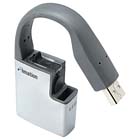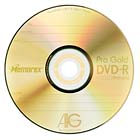SECURITYSystems: Lockdown Memory Leaks

From security video to sensitive financial and product information, duplicating the data in-house or outside has certain risks. The attraction of handy media holding ever larger amounts of data underscores the risk. Such new-age media includes Imation’s 4GB micro hard drive with a USB connector and Memorex’s Pro Gold Archival CD and DVD media.
You ask in-house IT to burn a disk and ship security video of an incident to corporate legal counsel. A month later the clip ends up in the hands of a defense attorney for the other side. The director of marketing sends new product designs to an outside CD duplication service for remote sales office briefings. A week before the official roll-out, a competitor rolls out a look-alike product – much too look-alike.
Today’s options for information distribution, storage and retrieval – on both the networked and personal level – are more varied than ever before.
Hard drives offer tremendous capacity, while flash memory offers convenience and portability. Indeed, the emerging acceptance of a standard platform for network and personal computing, along with introduction of the CD, has had a permanent effect on print’s dominance of data storage and transmission.
Optical disks can store the equivalent of thousands of volumes in document pages, text, graphics, images and video. Although data stored on such media can be printed out, in order to make large quantities of information readily available, the most cost-effective means is to provide access via LANs for communication within an organization, or over the Internet.

Direct control
The very qualities that make networks and “walkable” media appealing can be problematic when access needs to be restricted to a select few.There are essentially three main ways to produce custom CDs and DVDs: by using a built-in CD or DVD in a PC; by using an outside duplicating service; or in-house, using disk duplicating machines.
Here’s an example of the security issue: The high-speed duplicators used by duplicating services burn data to CD or DVD from internal hard drives. If the customer supplied a master CD, the duplicator will copy an image of that disk to the hard drive and burn it to CD-Rs. That data is then available to anyone who has access to that machine. Unless the service frequently purges data after jobs are completed, or you specify destruction contractually, it may remain available for a long time, and could, in the worst case scenario, accidentally be distributed to a third party.
Government agencies, banks and corporations are organizations that absolutely cannot afford to put their confidential data at that kind of risk. For this reason, as well as cost, there has been a growing trend toward in-house disk duplication.
Security can still be problematic. Imagine a duplicator with sensitive information permanently loaded onto its hard drive. Although efficient, it is similar to storing financial records in the memory of a photocopier. As a result, the latest generation of duplication products features a solution: high-capacity hard drives that can be removed and stored securely.
Although security should be the priority for enterprise security and integrators when choosing CD or DVD duplication products, the cost, capacity, speed, labeling capacity and network or PC interfaces are also important factors. However, where data security is a concern, a removable hard drive is a must-have feature.
Looking for a reprint of this article?
From high-res PDFs to custom plaques, order your copy today!





